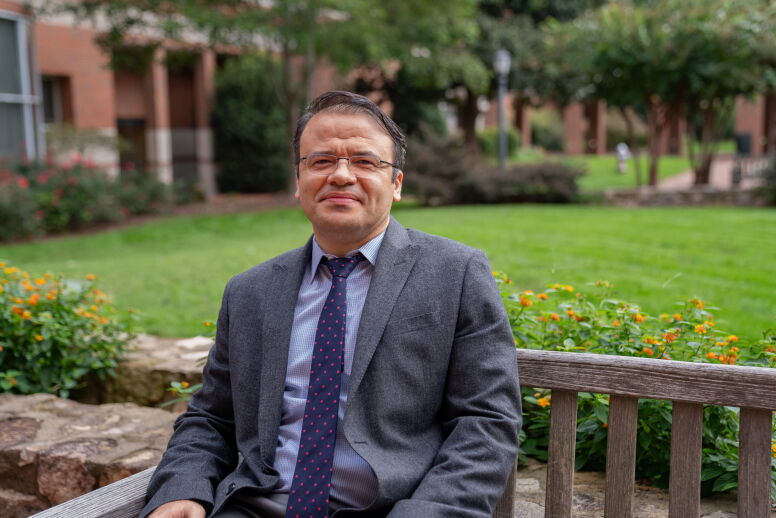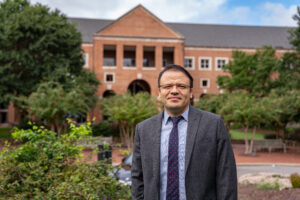News & Stories
Asking the right questions

Professor Ali Parlaktürk’s classes have developed a bit of a reputation at UNC Kenan-Flagler Business School.
A professor of operations, his first-year core MBA course is one that some students initially dread, especially those without a strong mathematical background.
“A fair number of students are scared of it,” Parlaktürk admits with a smile.
But, as many quickly discover, their fears fade as he works to make the material approachable – even fun.
“I try to make it accessible to all students,” he says. “I also try to have some fun in the class and use some humor, so students still enjoy the course.”
Parlaktürk’s ability to blend challenging content with a lighter touch has earned him respect at UNC Kenan-Flagler – even among students who didn’t expect to like his class – and teaching awards.
“People often say they didn’t think they would like statistics, or that it was the course they feared the most,” he says.
But Parlaktürk stresses the importance of data literacy for all business students.
“Everything is based on data,” he says. “Even if students won’t become data analysts, they will be interacting with data in their careers. We train them to ask good questions, understand what can be done with data, and know its limitations.”
Parlaktürk plays an important role as coordinator for the PhD Program in operations and data management. He takes great pride in their near-perfect placement record of their graduates, and many now hold faculty positions at peer institutions.
“It is a privilege to be part of their journey, witnessing their growth up close and helping them develop into future scholars,” he says.
Customer behavior, product choice and design
Parlaktürk also is an accomplished researcher, having been published in top-tier academic journals such as Management Science, Manufacturing & Service Operations Management and Production and Operations Management (POMS). He also serves as associate editor for Management Science Journal and senior editor for POMS, premier journals in his field.
In his research, he tackles some of the biggest questions in operations and supply chain management, focusing on three key areas.

Parlatürk’s research focuses on how operational designs are impacted by strategic customer behavior, supply-chain design and product-line choice.
First, he studies how firms design their product lines using technologies like 3D printing and mass customization. He explores the impact of these innovations on both what companies offer and how they sell their products — whether through retailers or directly to consumers.
Second, he examines how customer behavior affects operations. Traditionally, operations research viewed demand as a static figure, something businesses didn’t need to think much about.
Parlaktürk challenges that assumption. “I look at how customers make choices, how that leads to demand and how that affects operations,” he says.
His work on customer decision-making reveals how bargain-hunting behavior can affect supply chains.
“A bigger and bigger portion of sales are happening at discount prices now,” he notes, “and then I take a step back and ask how does this affect operations.”
Finally, he explores how companies design their supply chains, particularly in relation to partnerships and vertical integration, where a company controls multiple parts of its supply chain, instead of depending on outside suppliers or distributors.
His research in this area has uncovered surprising dynamics, especially in how firms handle the issue of customer expectations of discount prices.
While many companies try to curb bargain hunting by offering limited discounts or exclusivity, Parlaktürk found that this approach can backfire in certain supply chains.
“If your supplier knows you plan to have a very small quantity of sale, they will set a higher wholesale price to protect themselves. So, it becomes lose-lose,” he says.
His findings have big implications for businesses, particularly those that rely on external partners. It highlights the need for businesses to carefully consider how their operational decisions impact the entire supply chain, especially when working with external partners.
Asking deep questions
Parlaktürk’s academic path, meanwhile, was shaped by his early love for learning and intellectual curiosity. “I was always interested in trying new things and fascinated by deep questions,” he recalls.
He earned his BS in industrial engineering from Bilkent University in Ankara, Turkey, and then his MS in statistics from Stanford University and his PhD in operations, information and technology from the Stanford Graduate School of Business.
“Even if students won’t become data analysts, they will be interacting with data in their careers. We train them to ask good questions, understand what can be done with data, and know its limitations.”
Parlaktürk had multiple career options but ultimately chose academia because it offered him the freedom to explore topics he found most intriguing.
“I like this lifestyle because I can study things I care about,” he says.
When deciding which business school to join in 2005, UNC Kenan-Flagler stood out to him for its collaborative atmosphere and the potential for growth.
“Meeting some people from UNC, it was clear they were very collegial and very supportive of each other,” he recalls. “Since then we’ve hired so many great people, and today we’re one of the strongest research schools in the U.S.”
Outside of academia, Parlaktürk has a few hobbies that keep him grounded. An avid gardener, he enjoys growing tomatoes, peppers, cucumbers and herbs in his backyard. “It’s nice to see them grow and have it right there in your yard,” he says.
He’s also a devoted soccer fan, following European teams closely. His two children keep him busy as well.
In the classroom, his courses might initially intimidate some students, but Parlaktürk’s approachable style and deep passion for his subject help them gain important skills for the data-driven world of business.
By the end of his class, many students find themselves appreciating – even enjoying – the very material they once feared.